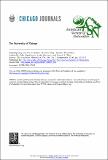Haplodiploidy and the evolution of eusociality : worker revolution
Abstract
Hamilton suggested that inflated relatedness between sisters promotes the evolution of eusociality in haplodiploid populations. Trivers and Hare observed that for this to occur, workers have to direct helping preferentially toward the production of sisters. Building on this, they proposed two biological scenarios whereby haplodiploidy could act to promote the evolution of eusociality: (a) workers biasing the sex allocation of the queen's brood toward females and (b) workers replacing the queen's sons with their own sons. This "worker revolution," whereby the worker class seizes control of sex allocation and reproduction, is expected to lead to helping being promoted in worker-controlled colonies. Here, we use a kin-selection approach to model the two scenarios suggested by Trivers and Hare. We show that (1) worker control of sex allocation may promote helping, but this effect is likely to be weak and short lived; and (2) worker reproduction tends to inhibit rather than promote helping. Furthermore, the promotion of helping is reduced by a number of biologically likely factors, including the presence of workers increasing colony productivity, workers being unmated, and worker control of sex allocation being underpinned by many loci each having a small effect. Overall, our results suggest that haplodiploidy has had a negligible influence on the evolution of eusociality.
Citation
Alpedrinha , J , Gardner , A & West , S A 2014 , ' Haplodiploidy and the evolution of eusociality : worker revolution ' , American Naturalist , vol. 184 , no. 3 , pp. 303-317 . https://doi.org/10.1086/677283
Publication
American Naturalist
Status
Peer reviewed
ISSN
0003-0147Type
Journal article
Description
The authors thank Balliol College, the European Research Council, the Leverhulme Trust, the Royal Society, and the PhD Program in Computational Biology (PDBC) of the Gulbenkian Institute of Science (IGC)/Foundation for Science and Technology (FCT; SFRH/BD/33206/2007) for funding.Collections
Items in the St Andrews Research Repository are protected by copyright, with all rights reserved, unless otherwise indicated.

